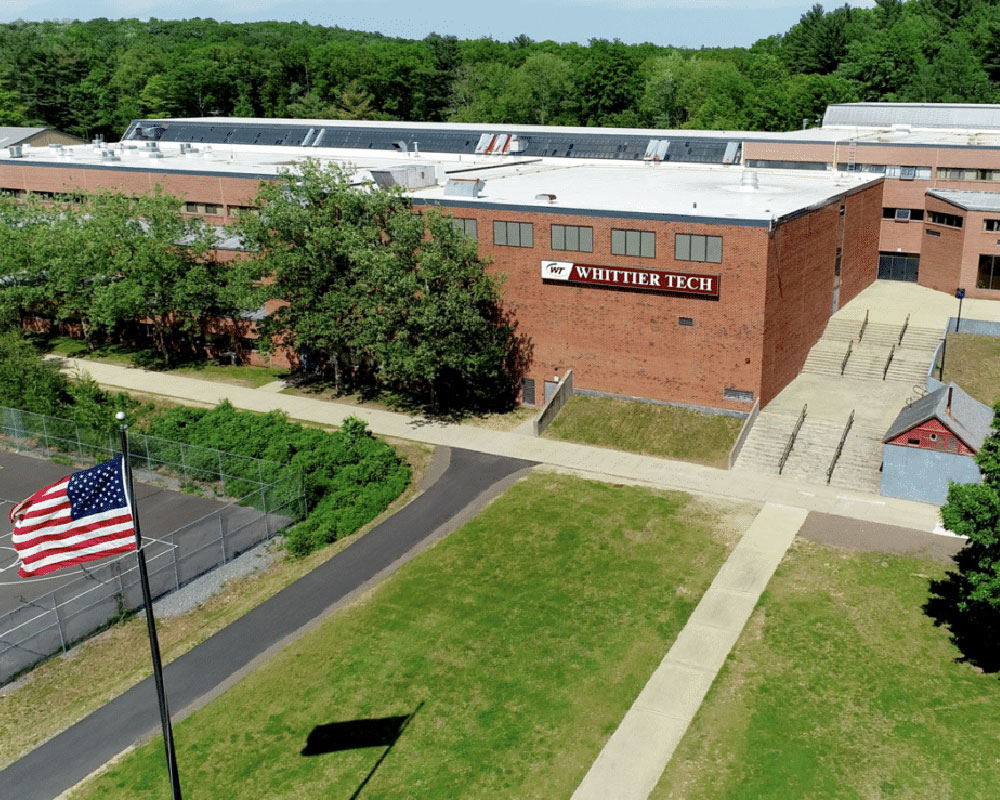Haverhill city councilors were largely favorable Tuesday night towards plans to build a replacement Whittier Regional Technical Vocational High School, but pressed for a lower price tag in hopes of gaining voter approval during a Jan. 23 districtwide vote.
Superintendent Maureen Lynch advocated for the $444.6 million rebuilding of the 50-year-old school. After reimbursement from the Massachusetts School Building Authority, taxpayers are expected to share the $264 million cost of the three-story, W-shaped building. Pending approval, construction would begin in 2025, with the new school opening in September 2028.
It will house mostly vocational, specialty, support and community programs on the first two floors and academic classes on the third. The campus will include new baseball and softball diamonds, tennis and basketball courts and a soccer field. The current stadium will remain. Tia M. Gerber, director of community partnerships at Whittier Tech, described the school’s role in bolstering the region’s workforce.
“If you were to pull into Whittier Tech on an evening, we recommend you do so,” Gerber said. “There are hundreds of cars pulling into the parking lot for educational purposes. Whether or not it’s digital photography or basic sewing, a personal enrichment class for fun, or if it’s a career-training opportunity, a thousand-hour cosmetology training program, a marine technician program, a welding career training program, we have it all.”
In arriving at its recommendation to rebuild, Lynch explained the Whittier School Building Committee preferred the cheaper and shorter construction process. Were voters to reject the plan, renovations are estimated to cost taxpayers $364 million over a 10- year period that would disrupt normal operations at the school.
If the vote fails, Lynch listed the most urgent issues to be addressed. The wastewater treatment plant needs to be replaced, as well as the heat, electrical and plumbing systems. “Right now, we do not have any sprinklers in the building, and when you think about that, we have a welding program next to a carpentry program, that’s looking for a problem,” Lynch said.
Mayor James J. Fiorentini, who said he would vote to authorize the project, pointed out that Whittier Tech will need an additional vote to pay for it—a Proposition 2 ½ override, or so-called “debt exclusion.” The proposition limits the amount of property taxes Haverhill can levy, with an override allowing a greater-than-usual tax increase for the duration of the construction.
“Any sort of an increase, whether it be a dollar or a hundred dollars, is going to be a sacrifice,” Fiorentini said. “I’m asking all of you to make that sacrifice and to vote twice for the new Whittier Vocational Technical School, something that would be wonderful for our community over the next decades.”
Though it would vary house-to-house, Lynch estimated Haverhill residents to expect an additional $270 per year in taxes, based on the city’s median home value of $495,000.
While most members of the public who spoke at the Council meeting expressed overwhelming support for the project, Debbie Gangie, a self-described “fiscal conservative,” called for the plan to be scaled back.
“I find the dollars mind-boggling. I am not opposed to rebuilding the school at all. I am opposed to the dollar amounts,” Gangie said. “When I think of the amount of students that go to Whittier versus to the other 11 communities’ high schools, it’s a smaller amount, but yet when you look at the plan, Whittier is asking for multiple fields for the same sport. I don’t think any other community has that.”
Though she called the price tag “breathtaking,” City Councilor and mayor-to-be Melinda E. Barrett said the long period of renovation is no more palatable. She suggested some cost-cutting measures, noting that the Committee recommending Haverhill’s new Dr. Albert B. Consentino School shaved off $28 million.
“Especially, if you look at the areas not covered, or not reimbursed by the MSBA, the superintendent’s office can be much smaller,” Barrett said. “Any non-student areas that the MSBA does not cover, you have to take a real hard look at those areas and see where you can condense, consolidate, trim it down.”
Lynch said they had already reduced the cost by $10 million, adding that she expects construction costs to go down as COVID-19 economic shocks begin to wear off.
“Just like we have done since the beginning, we will shake down every grant possible to bring down the cost. If there’s ways we can use our kids, our kids could build dugouts, for instance, out on the fields. We’ve done that in the past,” Lynch said. That’s a great experience.”
Also in favor of rebuilding, Council Vice President John A. Michitson called the decision a “no-brainer” because of the difference in costs. To stave off suspicious citizens, he advised Lynch to make that as clear as possible by finding an independent body—like the Massachusetts government—to certify the estimated cost of renovation.

